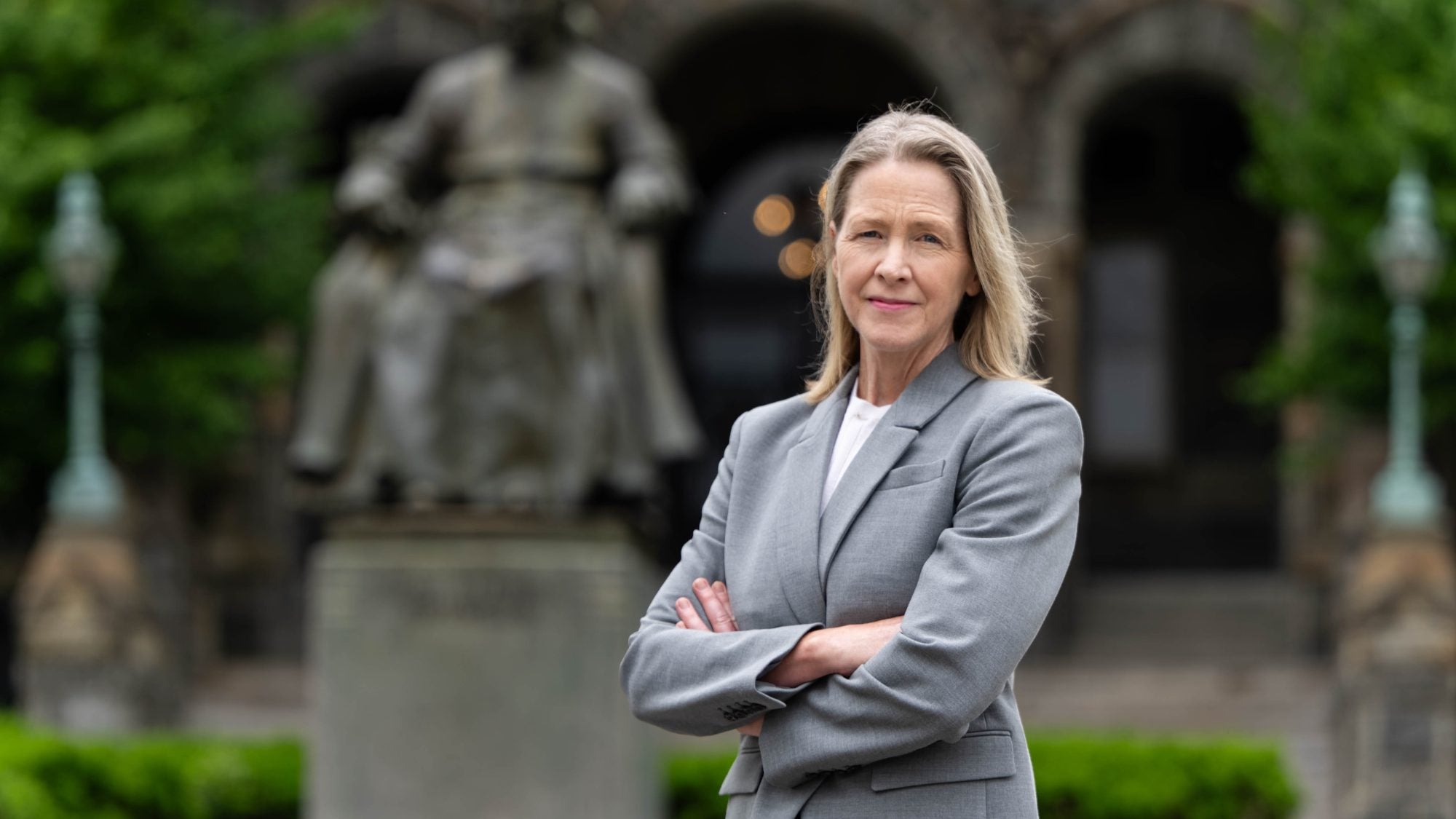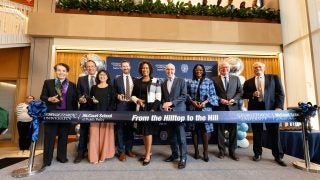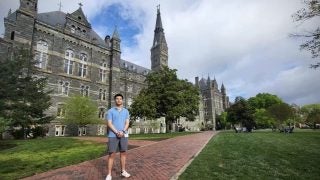Carole Roan Gresenz, a health and public policy professor at Georgetown, has been named the dean of the McCourt School of Public Policy.
She will begin her new position on August 1.
As dean, Gresenz will lead Georgetown’s growing public policy school with over 200 faculty members and 500 students. The McCourt School, which recently relocated to the Capitol Campus in downtown Washington, DC, will welcome its first cohort of undergraduate students in the Joint Program in Public Policy this upcoming fall semester. 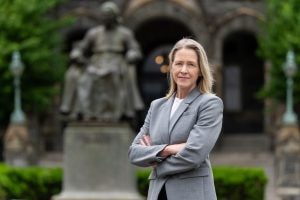
“Carole is an excellent choice for the next dean of the McCourt School,” said Georgetown Interim President Robert M. Groves. “She has years of leadership experience in research and higher education administration. She is committed to nurturing our junior scholars and students. With her deanship, we are fully optimistic about the McCourt School’s continued growth on the Capitol Campus.”
Gresenz currently holds an appointment in the McCourt School of Public Policy. From 2019 to 2021, Gresenz served as the interim dean of the then School of Nursing & Health Studies and navigated the school through the COVID-19 pandemic.
“Carole brings experienced and thoughtful leadership to the McCourt School, and I am eager to see the school’s growth under her direction in this exciting new chapter,” said Frank McCourt (C’75), the founding donor of the McCourt School and executive chairman of McCourt Global.
Prior to Georgetown, Gresenz worked for over 20 years at the RAND Corporation, a research institute, serving as a senior economist and the director of the Economics, Statistics, and Sociology Research Department.
“I believe strongly in the mission that anchors our work in McCourt,” Gresenz said. “I will do all that I can to foster the success of our faculty, staff, students and community so that we can best meet that mission.”
Get to know Gresenz, her research in health economics and her vision for the McCourt School of Public Policy.
Meet Carole Roan Gresenz
How did you get interested in economics?
As an undergraduate, I attended Loyola University in Maryland and majored in economics. In my junior year, I participated in the Washington Semester on Economic Policy at American University and had the opportunity to meet economists working across different institutions. Among other places, we visited the World Bank, Urban Institute and Congressional Budget Office, for example. The experience showed me the many ways in which one could use economics in a policy context, and inspired me to get my Ph.D. and work in public policy.
How would you describe your research interests?
In the early part of my career, I worked on a very diverse set of projects – everything from studying attrition among military pilots to helping develop a new national survey on alcohol, drug and mental health care to looking at dispute resolution in health care contexts. Every RAND researcher has to cover their time with funded work, and I cast a wide net to make sure I was fully employed. Those early experiences cultivated a lifelong interest in learning new topic areas and exposed me to the growth and joy that comes from working with new teams. My research has continually evolved over time as a result. In recent years, I’ve focused primarily on two strands of work. One is on topics related to U.S. gun policy and the other is on Alzheimer’s disease and the effects that it can have on people’s financial well-being in the time before diagnosis.
You worked in the think tank space for 20 years. Why did you pivot to higher education and Georgetown?
I loved my time at RAND and learned so much. I left and moved to Georgetown when I felt like it was time in my professional career to explore a new environment. I was attracted to Georgetown’s mission and values and also interested in the educational side of academia.
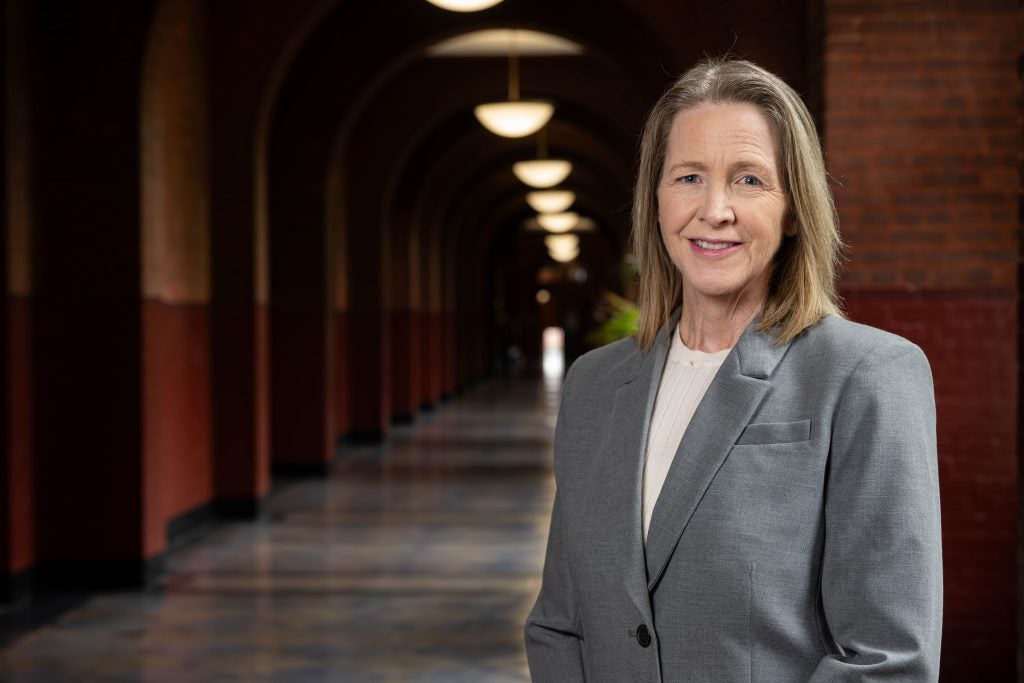
What aspect of Georgetown’s values speaks to you the most?
I just returned from the first sabbatical of my professional life. I took part in Georgetown’s Campion Residency program at Oxford University. Campion Hall is the Jesuit residence at Oxford, and my time there was a life experience in cura personalis. I was warmly welcomed into a community of scholars and students from all over the world, and enjoyed communal dinners, great conversations and the creation of many new friendships. I’ve often heard the term cura personalis translated as “care for the whole person,” but other definitions include the idea of “profound care and responsibility for one another.” And the latter really describes my experience at Campion and represents a value at Georgetown’s core.
You spent two years as the interim dean of the then School of Nursing & Health Studies. What are you proud of in your time in that role?
The COVID-19 pandemic emerged just a few months after I began my service as interim dean, so it was an exceptionally challenging period and a real learning experience for me. I had the opportunity to work closely with my fellow deans during that time, and our work together was both sustaining to me as a leader as well as critical, I think, to how well we were able to navigate as a university through such difficult circumstances.
What drew you to this role as dean of the McCourt School?
Public policy has been a through line in my career. I’ve always been interested in work that serves the public interest. McCourt’s mission is grounded in tackling the complex issues of today, empowering and inspiring the leaders of tomorrow, building bridges between our work and communities, and creating opportunities for critical dialogue. My values align closely with these priorities. I am also drawn by the enormous set of opportunities that await the McCourt School in its future. We are building from a strong foundation and with an exceptional new home on Georgetown’s Capitol Campus. I am grateful for the extraordinary work of our former dean and many faculty and staff and steadfast philanthropic support from Frank McCourt that have together brought the school to where it stands today.
How would you describe your vision and goals for the McCourt School?
My priorities are to work with our faculty, staff, students and alumni on several goals. The first is fostering the success of our new Joint Program in Public Policy. We are at an important moment for the school as we welcome our first cohort of undergraduates in the Joint Program. Second is continuing our work to remove barriers and increase the accessibility of an education in public policy at McCourt. Third is supporting our community in the creation and communication of new knowledge to inform the issues of today. And fourth is to be a cornerstone in a thriving future for Georgetown’s Capitol Campus.
How does the McCourt School fit into the broader Georgetown community?
The broad umbrella of policy means we have many points of intersection with other schools. And those points of connection offer opportunities for collaboration. Already, we are collaborating with the College of Arts & Sciences around the Joint Program in Public Policy, and we offer a joint Master’s of Public Policy and Law degree, for example. In the future, we hope to foster more collaboration across the Capitol Campus and beyond, including around research.
How do you hope to leverage the location of the McCourt School on the Capitol Campus to further drive its mission?
I see many different possibilities. Our new home provides increased opportunities for students, faculty and staff to interact with each other, and I hope will contribute to the cohesiveness of the McCourt community. We also have a beautiful convening space on the top floor of the building that can continue to help foster deeper connections with our alumni and with the local DC community. Our location downtown also provides new living and experiential learning opportunities for our undergraduate students.
What do you like to do outside of work?
I enjoy all kinds of health and fitness-related activities. For a long time, I was primarily a runner and racked up a fair number of ten-mile and half-marathon races. Over the last 10 years, I’ve gotten more into strength training, and that has now become my primary focus. I really enjoy trying new activities, too. This last year, I tried out boxing/kickboxing, learned to play pickleball and taught a strength and balance class for seniors at the local senior center. I try to anchor myself every day with at least an hour of some kind of athletic activity. It’s a good complement to professional work that requires a fair amount of sitting at a desk or in meetings.
What do you want McCourt students to know about you?
I believe strongly in the mission that anchors our work in McCourt. I will do all that I can to foster the success of our faculty, our students and our community so that we can best meet that mission. I also place a high value on being accessible and look forward to chances to engage with and get to know students.
